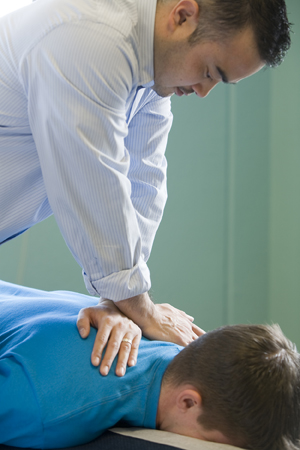A
B
C
D
E
F
G
H
I
J
K
L
M
N
O
P
Q
R
S
T
U
V
W
X
Y
Z
Click a letter to see a list of conditions beginning with that letter.
Click 'Topic Index' to return to the index for the current topic.
Click 'Library Index' to return to the listing of all topics.
Complementary Care for Pain
When a nonmainstream method is used together with conventional medicine, it is called complementary. You may find pain relief with complementary care. Look for a licensed or certified professional. And always tell your healthcare provider that you are using complementary care. Here is a look at some common forms of complementary care.
Massage
Massage therapy can increase circulation and relaxation. It is done by manipulating soft tissues of the body. This may help ease stress and pain. It is often done on a short-term basis.

Biofeedback
Biofeedback uses patches (electrodes) on different parts of your body to measure the body's physiological activity. This includes heart rate, blood pressure, and muscle activity. This information is used to help train you to learn to control certain bodily processes that you don't control. These include heart rate, muscle tension, and skin temperature. A biofeedback therapist will guide you through relaxation methods. The monitors sees how your body responds.
Chiropractic
Chiropractic treatment uses a therapeutic manipulation of the spine and joints. It may help reduce back, neck, or joint pain. Chiropractic may also use mild electrical stimulation, massage, heat, or ultrasound (sound waves).
Acupuncture
Acupuncture uses thin needles. These are inserted in the skin at strategic points. The purpose is to stimulate nerves and muscles to help treat pain. This treatment may cause the body to release its own natural painkillers and feel-good chemicals. At the same time, it relaxes the nervous system.
Distraction
Distraction helps you focus on something besides pain. Try reading a book, watching a movie, or talking with family. Or visit a local attraction.
Meditation
Meditation helps you focus on words, objects, or ideas. There are several types of meditation that can relax your mind, decrease stress, and help ease pain.
Relaxation
Relaxation includes methods like listening to soothing music or relaxation tapes. You might try slow, deep breathing. Imagine a calm scene, like an ocean or mountain, as you breathe. This method may be used in biofeedback.
Online Medical Reviewer:
Marianne Fraser MSN RN
Online Medical Reviewer:
Michelle Johnson BSN RN AMB-BC
Online Medical Reviewer:
Rita Sather RN
Date Last Reviewed:
3/1/2024
© 2000-2026 The StayWell Company, LLC. All rights reserved. This information is not intended as a substitute for professional medical care. Always follow your healthcare professional's instructions.